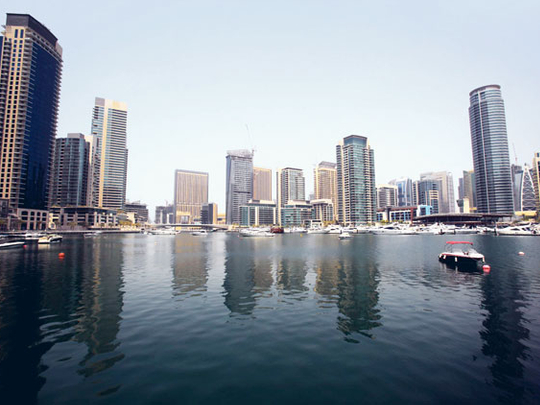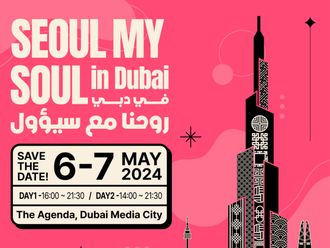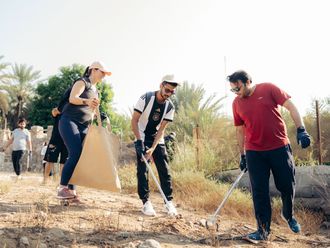
Cities, those ubiquitous models of development, are collectives of people sharing space. In urban structures, space is a commodity commanding high rents. On the other hand, space lying vacant is not living up to its potential. It remains dormant, with no value to either the government or its people. It incurs opportunity costs by missing chances gone begging.
Through the boom years, a huge amount of residential, retail and commercial space came into Dubai's market and was snapped up by investors. The Shakespearian flaw in this was the assumption that space itself was currency, which people were willing to hoard without caring about eventual use.
Since then, some of Dubai's spaces have again become available in the aftermath of the global financial reality check, either having come back to the original developers because of defaults, having been left behind or having come into a market without the capacity to absorb them. They lie vacant, paradoxically, for there are a million uses they can be put to. Those vacant offices with locked doors, defunct boutiques with lopsided blinds, unused office complex floors that are pristine yet deserted, are not generating returns.
Hypothetically, what if they were made available to users? What if one could turn them over to content creators, entrepreneurs, thinkers and businesspeople? Those who create cultural or economic goods require physical space for productivity. For all the advances in social media, compressing people into physical spaces remains the best way to generate new content, both in the cultural and the economic sense.
Architect Jumana Jabri, who is closely involved with the Dubai at Work initiative, is an ardent advocate for more productive use of extant space.
"Space is in abundance in Dubai. While a large part of it is occupied by retail stores, offices, food and beverage establishments and residential apartments, there are empty pockets waiting for tenants. There is immense potential in matching these spaces with temporary use such as film screenings, reading corners, workshop space, Wi-Fi points," she says.
Of course, regulations remain a concern for such usage. Jabri's concepts could well be stifled by the enervation of seeking relevant permissions. Emirati commentator Sultan Sooud Al Qasimi is unequivocal in stating that overly bureaucratic policies can hinder entrepreneurialism, slowing the impetus to create ideas and products both economic and cultural.
"Dubai's ascent over the past century was kick-started when its ruler Shaikh Maktoum Bin Hasher Al Maktoum eliminated taxes towards the end of the 19th century. Today we don't need consultants to tell us how to proceed to jump-start the economy again. Our ancestors have done it before and we can certainly take a page from that and do it all over again. Eliminating bureaucracy and lowering the cost of starting businesses for nationals and expats must be regarded as a strategic policy," he says.
Al Qasimi makes a strong case for greater deregulation. Space is an asset that does not depreciate with use. Rather, turning it to alternative relevance will assure return in reputation and brand recognition, if not outright rents.
Jabri also offers other ideas on how alternative space usage benefits developers and landlords. "Partnering these spaces with [community] programmes would help decide the space's optimum long-term use. This has a twofold benefit — it lessens the risk of the real estate developer or private owner by providing a testing period and allows the community to create programmes that are most relevant to it," she says.
Landlords are in effect given free feedback on the best use of available space. Businesses are known to spend well to get accurate information. In this instance, they would get it without additional cost. Jabri believes urban maturity necessitates eventual cooperation between space owners and locally driven initiatives, where sprawling real estate developments partner with and are partially co-opted by local needs.
Dubai resident and artist Ubik, who is known for his street-art-inspired abstract profiles, argues that commercial spaces lying vacant mean the developers' plans have hit a roadblock. So there is no harm in using them to create and disseminate cultural content. For the developer, it generates goodwill without cost with the further incentive of targeting a captive audience.
Can turning unused space into impromptu art exhibitions be viable for the developer or landlord? Math might not be able to make a business case, for a local artist will not pay as well as a multinational. Yet the new commerce involves creativity and the construction of cultural goods that, in the long run, can attract tourism and creatively inclined people to bolster economic-cultural productivity.
For developers, turning over unused space to community, creative and entrepreneurial initiatives is not just a form of support but also an assurance that unused assets are at least generating footfall to possible commercial benefit.
If developers are unwilling to hand over space unassisted, government initiatives can subsidise them for offering space for communal and entrepreneurial use.
Emirati commentator Mishaal Al Gergawi's argument on the issue is driven by economic imperatives and a realisation that the country's future will be decided by present entrepreneurial activity.
It is possible that none of the ideas discussed above are the ideal but they all hint at a recognition that Dubai's leadership is trying to catalyse an economy capable of producing ideas, content, services and physical goods.
Hisham Wyne is a columnist and copywriter who is fascinated by arts, culture and community, and also writes on global sociopolitical issues.












